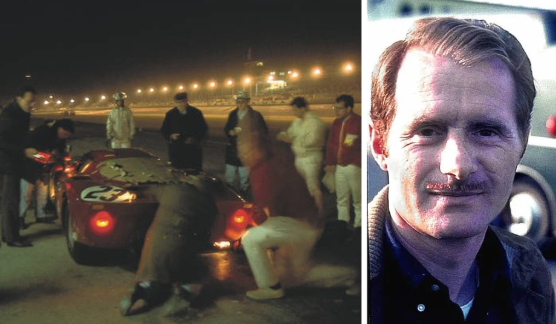Lucien Bianchi was one of Belgium’s most recognized names in motorsport history, a man who lived and breathed the excitement of racing. Known for his courage and versatility, he competed in Formula One, endurance racing, and legendary events like the 24 Hours of Le Mans, leaving behind a legacy that still resonates today.
Quick Bio
| Quick Bio | Details |
|---|---|
| Full Name | Lucien Bianchi |
| Birth Date | 10 November 1934 |
| Birthplace | Milan, Italy |
| Nationality | Belgian |
| Occupation | Professional Race Car Driver |
| Racing Disciplines | Formula One, Endurance Racing, Le Mans |
| Teams Driven For | Cooper, Lotus, ENB, Ferrari, Alfa Romeo |
| Notable Achievements | 1968 Le Mans Winner, Formula One podiums |
| Family Ties | Uncle of Jules Bianchi (Formula 1 driver) |
| Death | 30 March 1969, Le Mans, France |
Early Life and Background

Lucien Bianchi was born in Milan, Italy, in 1934, to Belgian parents. Despite being born in Italy, he grew up in Belgium, where his fascination with cars and speed began at a very young age. His family had deep ties to the motorsport world, making his career path almost destined. Racing quickly became not just a passion but a calling. Unlike many who stumble upon motorsport, Bianchi’s early exposure gave him the determination to push into professional racing.
Entry into Motorsport

Bianchi’s journey into professional racing began in the 1950s. He started in touring cars and smaller racing categories, where he built a reputation for being both fearless and adaptable. His skills caught attention, and soon he was competing in prestigious endurance events. Bianchi was not just limited to one form of racing; he had the unique ability to switch between different racing disciplines. This versatility later became one of his trademarks, setting him apart from many contemporaries.
Rise to Formula One
By the late 1950s, Lucien Bianchi made his entry into Formula One, the pinnacle of motorsport. He first competed in 1959 with the Belgian team ENB (Écurie Nationale Belge). Though his early races were tough, he persisted and gradually earned respect in the paddock. Over the years, he drove for several iconic teams, including Cooper, Lotus, and Ferrari. His best results in Formula One included podium finishes, which highlighted his driving talent in an era when racing was extremely dangerous and unpredictable.
Major Achievements

The crowning moment of Bianchi’s career came in 1968 at the 24 Hours of Le Mans, where he and co-driver Pedro Rodríguez secured a remarkable victory for Ford. This achievement placed him in the history books as one of Belgium’s greatest racing drivers. Apart from Le Mans, he had numerous successes in endurance racing, including strong performances in the Targa Florio, Sebring 12 Hours, and Spa-Francorchamps events. These triumphs solidified his reputation as not only a Formula One driver but also a true all-around motorsport competitor.
Challenges in His Racing Career
Like many drivers of his era, Lucien Bianchi faced immense challenges. Racing in the 1960s was notoriously dangerous, with limited safety measures and high fatality rates. Mechanical failures were common, and accidents often had tragic outcomes. Despite the dangers, Bianchi’s resilience was unmatched. He overcame multiple crashes and setbacks, never allowing fear to dictate his passion for racing. His determination to compete at the highest level, regardless of risks, made him a respected figure among fellow drivers and fans.
Driving Style and Personality
Bianchi was known for his smooth yet aggressive driving style. He was strategic in how he approached each race, often preserving his car when necessary but never hesitating to push the limits when opportunities arose. Outside the track, he was admired for his warm personality and humility. Many of his peers described him as approachable, friendly, and deeply passionate about the sport. This balance of skill and character made him a beloved figure in motorsport circles.
Contributions to Belgian Motorsport
As one of Belgium’s most prominent drivers during the 1960s, Lucien Bianchi played a pivotal role in putting the country on the motorsport map. Belgium already had notable figures such as Jacky Ickx, but Bianchi’s success in both Formula One and endurance racing strengthened Belgium’s image as a nation producing talented drivers. His influence encouraged younger generations to pursue careers in motorsport, inspiring many who came after him.
Family Legacy in Motorsport
Lucien Bianchi’s family has a remarkable connection to motorsport. His nephew, Jules Bianchi, became a Formula One driver in the 2010s. Sadly, just like Lucien, Jules’s life was cut short due to a tragic racing accident, creating a heartbreaking parallel across generations. This family legacy highlights not only their passion for racing but also the inherent risks associated with the sport. The Bianchi name, therefore, stands as both a symbol of achievement and a reminder of motorsport’s dangers.
The 24 Hours of Le Mans Victory
Among Bianchi’s achievements, the 1968 Le Mans victory stands as the defining highlight. Driving a Ford GT40 alongside Mexican driver Pedro Rodríguez, Bianchi showcased endurance, consistency, and skill over 24 grueling hours. This win was historic, not only for him personally but also for Belgian motorsport, as it elevated his reputation internationally. The Le Mans victory remains one of the most celebrated moments of his career and continues to be associated with his name.
The Tragic End
Tragedy struck on 30 March 1969, during testing for the 24 Hours of Le Mans. Bianchi lost his life in an accident while preparing for the race he had conquered the previous year. His death was a devastating blow to the racing community. At only 34 years old, Bianchi had so much more to give to the sport. His passing was a stark reminder of how perilous racing was during that time, when safety standards were minimal compared to today’s advanced technology.
Remembering Lucien Bianchi
Though his life was cut short, Lucien Bianchi’s impact on motorsport continues to be remembered. Fans, historians, and racing enthusiasts still talk about his achievements, especially his endurance racing triumphs. Many consider him one of the unsung heroes of Formula One, someone who deserved more recognition than he received during his career. His legacy lives on in Belgium’s racing culture, as well as in the memories of those who witnessed his talent firsthand.
Influence on Future Drivers
Bianchi’s determination, courage, and success inspired countless drivers. From Belgian talents like Jacky Ickx to his nephew Jules Bianchi, the influence of his career extended beyond his lifetime. His achievements set a standard for excellence and proved that Belgian drivers could compete at the highest international levels. Even today, his story motivates aspiring racers to pursue their dreams regardless of obstacles.
Legacy in Motorsport History
Today, Lucien Bianchi is remembered as a symbol of passion, perseverance, and dedication. His name is forever linked to the 1968 Le Mans win, but his impact goes far beyond that single race. He contributed to Belgium’s proud racing tradition and remains a historical figure in motorsport. His life serves as a reminder of both the glory and the risks of racing, making his story one of the most fascinating in the sport’s history.
Conclusion
Lucien Bianchi’s career may have been brief, but it was filled with milestones that secured his place in motorsport history. From his early racing days in Belgium to his Formula One experiences and his unforgettable Le Mans triumph, he demonstrated what it meant to be a true racer. Though tragedy cut his journey short, his influence continues to inspire drivers and racing fans alike. The story of Lucien Bianchi is not just about speed and competition, but about resilience, legacy, and the timeless pursuit of passion.
FAQs
Who was Lucien Bianchi?
Lucien Bianchi was a Belgian race car driver who competed in Formula One and endurance racing, best known for winning the 1968 24 Hours of Le Mans.
What was Lucien Bianchi’s greatest achievement?
His greatest achievement was winning the 1968 Le Mans alongside Pedro Rodríguez in a Ford GT40.
When did Lucien Bianchi die?
He died on 30 March 1969 during testing for the 24 Hours of Le Mans in France.
Which teams did Lucien Bianchi drive for?
He drove for teams such as Cooper, Lotus, Ferrari, Alfa Romeo, and ENB during his career.
Is Lucien Bianchi related to Jules Bianchi?
Yes, Lucien Bianchi was the uncle of Jules Bianchi, another Formula One driver who tragically died after a racing accident in 2015.
For More Latest Update oneuppress

